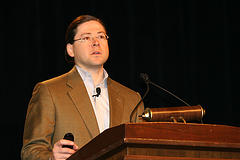 Friday April 15, 2005
Friday April 15, 2005
'Failed' as in 'succeeded wildly'
There's a real feeding frenzy going on about the CDDL right now, for reasons I don't understand. Maybe I should take it as a sign that those who hate Sun are really spooked by the fact that Sun actually appears to be doing things right with OpenSolaris. But whichever way I look at it, there's been a sudden rush of online chatter ranging from the sarcastic and spiteful through the shockingly misinformed to the plain wrong (no link - just look for fools -including analysts - claiming that OpenSolaris is in some way 'closed' before they have even seen it or the CAB has published a governance).
In the absence of a decent conspiracy theory, it seems the prompt for much of this is one remarkably intemperate remark in the otherwise pretty rational posting over at OSI on license proliferation in the open source meta-community. The remark in question is summarised by OSI thus
The class of asymmetrical corporate licenses that began with Mozilla was a worthy experiment that has failed. The new policy will discourage them.
and they go on to say
That strategy worked well in 1998, as a way of giving people a place that felt safe within which to rethink their assumptions. But seven years later, we think it is is significant that the original corporate open-source license, the Mozilla Public License, has been dropped by its originating organization in favor of the GPL. It is becoming increasingly clear from this and other examples that the "middle way" represented by Mozilla and other corporate open-source licenses is not a stable, effective solution even from the point of view of selfish corporate agents.
This is shockingly partisan and manipulative. Just neglecting for the moment that the MPL has in no sense been dropped by the Mozilla organisation, as a simple visit to Mozilla.org would have told the writer, the frame the writer is trying to create, defining the MPL as some kind of corporate Franken-license, is either an expression of profound inexperience or ruthless manipulativeness. Asserting things like Groklaw does:
a license under which programmers can write Brand X Open Source software, software that ends up not open at all on a whim, which the engineers get to write for them in the open and then the company gets to take closed and proprietary, and not only that, you don't get any code back from them in return for the code you donated, unless they feel like it.
shows a profound lack of understanding of how the MPL works - clearly someone with that mindset was also writing for OSI. MPL-style licenses don't allow that theft from the commons and it is dishonest to assert they do - hiding lies about the MPL behind criticism of the CDDL does nothing to change that. All changes to files in the commons have to be given back. Period. It is permitted for original work that's not in the original commons to be withheld from it - but why not, giving people no choice what they do with their work is a strange definition of "freedom". If it's OK for BSD-style licenses to leave that freedom, why is it wrong for MPL-style licenses to leave it too?
I've been thinking long and hard of a way to summarise the nature of open source to help with this sort of misunderstanding. The best summary I have come up with to date is as follows:
An open source software project is a software source-code commons maintained by a creative community, which uses the content of the commons to create richness and innovation, with and around the commons. In the process of that creativity, the community enriches the commons for the benefit of all and may be compensated by the recipients of the creative act.
Using that framework it's then easier to understand various aspects of open source. The license is chosen to facilitate the commons and to decide the way it is enriched. By definition, all open source licenses allow the commons to be used for any purpose - they differ mainly in how the resulting new works are treated.
- BSD-style licenses (of which I regard Apache v2 as the state-of-the-art) place no restriction on whether derived creations are returned to the commons. Thus the creative works of the community surrounding a commons created by a BSD-style license may be returned to that commons, may be applied to a different source-commons1 or may be incorporated into a closed-source work.
- GPL-style licenses require that derived creations, both resulting from the original commons and created newly around the commons, be licensed under the same license. The commons is thus enriched as it is used, but innovations created outside the commons can very easily be found to be licenseable only under the GPL and thus need to be compulsorily added to the commons - the artisan will often find that there is no freedom of choice in this regard.
- MPL-style licenses (of which I regard CDDL to be the state-of-the-art at present) require that creations derived from files in the commons be licensed under the same license as the original file, but allow newly-created files to be licensed under whatever license the creator of the file chooses. This is a win-win; the commons is continually enriched, and the artisan retains the freedom to license innovations in any way that's appropriate. That's GPL-style (copyleft) for your work on the commons and BSD-style for your own creations - what's not to love?
As well as offering the software craftsperson the maximum choice while protecting the commons for the benefit of its community, MPL-style licenses also work well for existing works that are being donated to the open source meta-community. They allow a working program to be placed in the commons without the need to change the licenses of all the files that comprise it on day one. This is the main reason Sun selected an MPL license for Open Solaris. If we'd decided to use the GPL, we would have needed to wait until the ownership of every file was precisely determined. As it is, on launch day this quarter there will be a fully buildable, linkable kernel available from opensolaris.org even though some of the files will still only be available in binary form, to be incrementally released as source as the due diligence is completed for them2.
I find the assertion that the Mozilla license is a failed experiment utterly ludicrous. On the contrary, it has succeeded beyond the wildest dreams of most people, with the consequence that some small defects in the original license3 have caused the MPL to be copied endlessly by responsible, detail-oriented corporate lawyers who couldn't in good conscience allow their employers to proceed without fixing them. Calling those people "selfish corporate agents" is ungenerous to the point of rudeness, even if their necessary fixes are the basis for the majority of the proliferation. Calling the MPL a failure is to fly in the face of the obvious fact that, if the MPL was a failure, there would be no proliferation and thus no need to act.
So what's the solution? Well, I am neither a lawyer nor a software license expert so I'd not presume to dictate a solution. However, Sun felt that the best way to address proliferation was to make a template license out of the MPL, and that's exactly what CDDL is. The solution is not to jettison this wildly successful licensing approach, the one that balances the freedoms of commons and artisans the best. The solution is to fix the defects so that the wild success can continue without license proliferation. Personally I am committed to that goal, be it achieved through the CDDL, through a revised MPL or through some other vehicle.
- This is why BSD-style licenses are usually considered "GPL-compatible". It's because the license permits re-licensing of derived works under a different license. Thus "GPL compatibility" is something of a deception as to be "GPL compatible" you actually have to be willing to have your license discarded and replaced with the GPL. It's more a Borg-like assimilation than compatibility, in my view, and pretty undesirable as it results in future code enrichment being accumulated in some other code commons.
- A very few files will have to stay binary-only - for example, a video driver that the video chip owner refuses to relicense - but the intent is for all possible files to be released as source.
- Those defects are:
- the fixed name of the licensor
- the right to change the license after the fact
- an over-reaching patent peace that makes the license unfair to small businesses who need to litigate against bigger competitors outside the scope of the commons created by the license
- the fixed choice of law and venue
I just reached Australia after an exciting week in Brazil. They are doing so much with the Java platform in open source over there! To find out more, read the stuff I just wrote on java.net.
April 14, 2005 06:20 PM PDT PermalinkGreat to see Stephen Harpster, Sun's director for the initiative to open source the Solaris operating system, with a new blog here on b.s.c. He starts out by refuting the idea that the Cobalt acquisition was responsible for the (temporary) demise of Solaris x86 a few years ago. If you're interested in more Solaris bloggers try Planetsolaris
April 08, 2005 12:18 PM PDT PermalinkI just arrived in Brazil for the two day "Cafe Brasil" extravaganza in Brasília, and already it's been fantastic. Sat and listened to a passionate appeal for open software with standards by the government's IT philosopher Sergio Amadeu, there has been a tenth birthday party for the Java platform complete with cafe and champagne and then to cap it all Brazil's IT agency SERPRO has announced that they have joined the JCP - the first government to do so. Wow, what a first few hours...
April 07, 2005 12:56 PM PDT Permalink Just been sitting at Open Source Business Conference listening to Jonathan Schwartz talking about the new business opportunities that come with open source.April 05, 2005 10:38 AM PDT Permalink
OpenSolaris Community Advisory Board Launched
(Updated)
The new OpenSolaris Community Advisory Board was just announced, and met for the first time, here in San Francisco. I'm delighted and honoured to have been named as one of Sun's two representatives. We also had a long conversation about Sun and open source with Jonathan Schwartz, who spent over 90 minutes in casual but impeccably informed conversation.
We actually had a pretty effective meeting considering it was the first time any of us had met. We discussed our charter (which is to devise and propose a model for defining how OpenSolaris is "governed"), our views on governance (and Roy's experiences at Apache are already proving invaluable), the need for transparency (we'll have a mailing list with public archives set up soon), how to make decisions (we prefer consensus and can't really see why any decision that the five of us can't agree should be made), how to run meetings (we'll take it in turns to chair them, we're a group of peers) and more - we asked Jim Grisanzio to act as secretary for the CAB and he has all the notes.
All in all, this is very exciting. Some may mock OpenSolaris as just a marketing exercise but it was obvious from the CAB meeting that that's not the case. The focus on the technical aspects of governance is already emerging - topics such as version control and the handling of binary-only components are high on the list - and I think OpenSolaris stands every chance of empowering a significant slice of the huge, global Solaris community to engage directly with the code on which they rely. The open source meta-community is getting a huge infusion of new members and today was a very important step in making it happen.
April 04, 2005 10:40 PM PDT Permalink
While there has been plenty of fuss about development tools for the Java platform, like Charles Ditzel I have been surprised how little comment has been made about the open source community success story which is the NetBeans Platform. The NetBeans IDE is just one example of a piece of software that can be made with the NetBeans platform - there are other examples, like the mobile network management software system that Nokia has built. Because it's 100% pure Java code, NetBeans provides an ideal base for this sort of success story - I remember back when it was launched one of the examples was of a hairdressing salon management system that was built from the NetBeans Platform.
This is especially cool because the diverse usage of the Platform means that a valuable synergy develops. Nokia's application and Sun's Java Studio Creator product have no market overlap for example, yet they contribute to each other's success because when Nokia finds a bug and fixes it, Sun benefits too (and vice versa) - it's the perfect example of the way that an open source commons allows different artisans in the 'guild' which uses it to create wealth (in the sense Paul Graham describes of making a 'good', not necessarily direct financial wealth) using their own skills while also enhancing the value of the commons to all other players.
April 02, 2005 10:41 PM PST PermalinkGreat news for Mac users - the energetic Patrick Luby (an Open Source Hero) has just published Release Candidate 1 for NeoOffice/J 1.1, the Java-mediated implementation of OpenOffice.org that he and Ed Peterlin have created for Mac OS X. I use it for all my document processing needs and now, for the first time, it is up-to-date with the stable release of OpenOffice.org as it uses v1.1.4 as its starting point. Well worth the 118Mb download, go get it now.
March 30, 2005 05:24 PM PST PermalinkIt's good to see IBM's official and public support [via Sean] for the forthcoming OpenDocument standard at OASIS:
"IBM views the OpenDocument standard as one of the most crucial enabling standards for IBM Workplace, and we are embracing it deeply and enthusiastically."
OpenDocument, of course, is the XML format pioneered at OpenOffice.org and used in StarOffice, as well as in a number of other document processing packages such as the open source AbiWord and KOffice. Already we're seeing people finding the OpenDocument format valuable - there's a plug-in for Google's desktop search that allows searching inside OpenDocument files (about time that became a core feature rather than a plug-in though - how about it, Google?), and I just found a Mac desktop application that searches inside OpenDocument files.
Document processing tools have clearly become commoditised (witness Microsoft's desperate measures calling their customers "dinosaurs" if they won't engage in the unnecessary 'upgrade' to the latest version of Office - that's 'dinosaurisation', the spread of software for fear of incompatibility). It's about time. We have all been held hostage to the upgrade arms race on document tools for too long, with its side effect of older documents becoming harder and harder to use and of organisations having a mix of incompatible versions even of the monopoly product. As OpenDocument becomes the accepted enterprise standard we'll finally see competition based on the value derived from the software and not on file format lock-in and abusive dinosaurisation.
March 28, 2005 08:20 AM PST PermalinkI notice Alan and Flip are organising the very first ever OpenSolaris User Group meeting in Santa Clara, California on April 26th. By a strange stroke of scheduling I hope to be there - maybe I'll see you there? I know there are folk in several places round the world who would like to form a local group, leave a comment for Alan or me if you would like to help get a group started where you are.
March 25, 2005 09:03 AM PST Permalink

